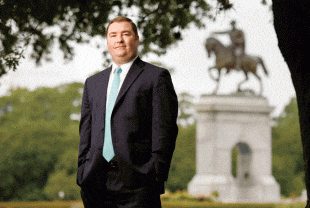Rice University
Office of Public Affairs
News and Media Relations
EXPERT ALERT
Amy McCaig
217-417-2901
amym@rice.edu
High stakes in the Lone Star State: Rice expert available to discuss Democratic presidential debate
HOUSTON – (Sept. 7, 2019) – Everything’s bigger in Texas, including the state’s number of delegates to the 2020 Democratic National Convention. Contenders for the Democratic Party’s nomination for leader of the free world will get face time with Lone Star State voters as they descend on Houston Sept. 12 for the third televised debate of the campaign season, to be held at Texas Southern University.
 Mark Jones, a political scientist at Rice University and an expert on Texas politics, is available to discuss the upcoming debate.
Mark Jones, a political scientist at Rice University and an expert on Texas politics, is available to discuss the upcoming debate.
“During this primary season, only California will elect more delegates to the Democratic National Convention than Texas, and the March 3 Super Tuesday primary in Texas could make or break several campaigns, particularly those of favorite son Beto O’Rourke and less favorite son Julián Castro, if they are still in the race by then,” he said.
Jones called the Houston metro area’s population “a microcosm of the Democratic Party’s demographics today.”
“It has robust populations of liberal and moderate Anglos, Latinos, African Americans and Asian Americans, as well as a thriving LGBTQ community,” he said. “It is also a global city where hearing different languages spoken throughout the city is the norm, not the exception, and something that is embraced and promoted rather than rejected and suppressed.
“With 7.1 million residents, the Houston metro area has a population that is greater than that of 36 states,” Jones continued. “And Houston area voters will elect more delegates to the Democratic National Convention than the first in the nation caucus and primary states of Iowa and New Hampshire combined.”
Jones said the debate also takes place at a critical juncture for many contenders.
“Third-tier candidates in the debate including Pete Buttigieg, Beto O’Rourke, Cory Booker, Amy Klobuchar and Julián Castro are in desperate need of a breakout performance that would propel them into at least the second tier — with Kamala Harris — and create separation with the rest of the third tier, whose prospects of capturing the nomination become dimmer with each passing week,” he concluded.
Jones, the Joseph D. Jamail Chair in Latin American Studies, professor of political science, fellow in political science at Rice’s Baker Institute for Public Policy and fellow at Rice’s Kinder Institute for Urban Research, is an expert on Texas politics and has been quoted widely in local, state and national publications. To schedule an interview, contact him directly at mpjones@rice.edu or 832-466-6535.
Rice University has a VideoLink ReadyCam TV interview studio. ReadyCam is capable of transmitting broadcast-quality standard-definition and high-definition video directly to all news media organizations around the world 24/7. Rice also has a university backdrop, 1080p web cam, light kit and wireless microphone for Skype interviews.
-30-
This news release can be found online at news.rice.edu
Follow Rice News and Media Relations via Twitter @RiceUNews
Follow Mark Jones via Twitter @MarkPJonesTX
Related materials:
Images for download: https://cpb-us-e1.wpmucdn.com/news-network.rice.edu/dist/c/2/files/2019/02/MarkJones2-ur0x54.gif
Photo credit: Mark Jones photo courtesy of Michael Stravato for Rice University’s Baker Institute.
Mark Jones bio: https://www.bakerinstitute.org/experts/mark-p-jones/
Located on a 300-acre forested campus in Houston, Rice University is consistently ranked among the nation’s top 20 universities by U.S. News & World Report. Rice has highly respected schools of Architecture, Business, Continuing Studies, Engineering, Humanities, Music, Natural Sciences and Social Sciences and is home to the Baker Institute for Public Policy. With 3,962 undergraduates and 3,027 graduate students, Rice’s undergraduate student-to-faculty ratio is just under 6-to-1. Its residential college system builds close-knit communities and lifelong friendships, just one reason why Rice is ranked No. 1 for lots of race/class interaction and No. 4 for quality of life by the Princeton Review. Rice is also rated as a best value among private universities by Kiplinger’s Personal Finance.

